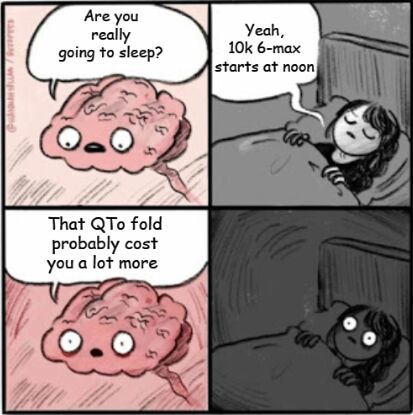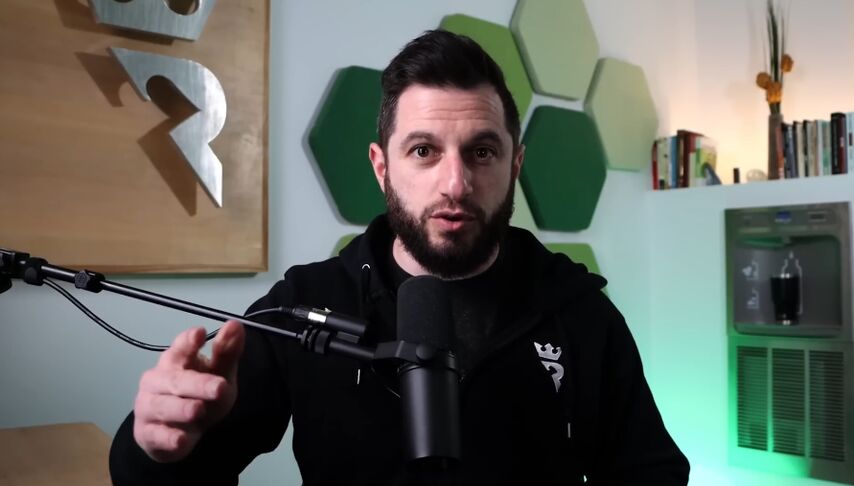Hi all! This is Phil, and today we're going to talk about the most common challenges that players face in multi-table tournaments.
I regularly get to the money, but I bust out long before the final table. What am I doing wrong?
First, I note that you may be doing everything right! Well, okay, no one plays perfectly, but it's possible to play at a very high level and not see results for a long time. Poker is a variance game, winning takes place in the long run, and in tournaments, a very long run is required. If there really is a problem, it's usually because you're playing too tight – or rather, too tight late in the game when it comes to shoving or calling your opponent's shoves correctly. Short stack and bubble play requires high aggression and a willingness to call with hands that are psychologically perceived as not strong enough. It is on this that a significant share of the expectation is won.
All players have a fear that they may bust out of the tournament. A good way to turn these fears to our advantage is to seize the initiative. Force your opponent to make tough decisions! Attack the blinds, 3-bet-shove on people who open too wide! Sharpen your game with stacks of 8bb, 10bb, 15bb, 20bb. You will be surprised how aggressively you need to gamble in some situations according to poker math. When you have 10 blinds in your stack, successfully stealing the blinds and antes increases your stack by as much as 25%! And if you get called, even the weakest hand in your range has a chance of winning, sometimes quite decent – 40-50%. So work on the theory, and at the table make an effort to actually follow it and play more aggressively.
I usually start well, but by the end of the first day, I'm wasting it all away...
There may be several explanations for this problem, but I want to draw your attention to the rational use of strength and endurance training. Live tournaments are exhausting. Every day you play 12-14 hours, sleep, if you're lucky, 6 hours, and so on day after day. Therefore, it is extremely important to wisely spend your energy and moderate expectations – do not expect a perfect game from yourself in all situations. You won't be able to play at full speed for 14 hours, and neither will your opponents. Mistakes related to fatigue and loss of concentration are inevitable.
How can we influence the situation? First, don't go overboard with caffeine in the morning. The blinds at the early stage are very small. In fact, you play much cheaper than at a later stage. All key decisions will be made much later. If you go overboard on the coffee in the morning, you will run out of energy just when you need it most. And you will either have to pump up again on caffeine, which will destroy your sleep, or finish the game barely alive.
In general, good sleep should be your top priority during tournament series. It is impossible to replace it. Therefore, in the few hours that separate the end of the game and going to bed, you must learn to switch your attention from poker to something else – otherwise, you will constantly relive the events of the game day, adrenaline will continue to be released, and you will not be able to fall asleep normally.

To switch, I use Elliot Rowe's recordings, but any type of meditation will do, and even a simple walk to music. Then you can chat with family or friends about anything but the game. This will help you relax.
I don't attach any importance to the blind structure – I don't see what good it could do!
There are several considerations. First, at some levels, the antes are a larger fraction of the big blind, and it becomes more profitable to steal pots. I prepare for them by playing levels with small ante mega tight, creating a nit image. You, too, can change your strategy based on the structure, or at least pay attention to the corresponding actions of other players. Secondly, some tournaments start very slowly. Let's say a starting stack of 200 bb turns into more than a comfortable 75 bb four hours after the start of the game. You may well rest for four hours more and take advantage of late registration. This is a debatable issue: some believe that many weak opponents come to the start, who give chips, and it is impossible to miss the first hours. This may be true, but if you're playing a grueling series like the WSOP,
I find it difficult to readjust when circumstances change dramatically. For example, after I was the biggest stack on the table for a long time, I played very aggressively, but I lost a big pot or got to another table and became an average stack. I either continue to play the same style out of habit, or I try to gamble in order to regain my dominant position at the table. It doesn't lead to anything good.
That's right. Flexibility and the ability to quickly adapt are the most important traits of a successful player. When circumstances have changed, and they do after every big pot, even if you weren't in it, and after every new face at the table, take a break from the routine and take a few minutes to reevaluate the situation. What should be your ideal strategy in the new environment? What has changed since the player to your right has a bunch of chips? Who should play tighter, and who should play looser? Tournament poker is an incredibly fast-paced game with a huge number of elements to take into account. “I have a medium stack, the cash is coming soon, I will play a little tighter” is not a good adjustment, it clearly lacks details. Don't be too lazy to think.
My problem doesn't show up very often, but it comes at a cost – I don't have much experience with shorthanded games like the final table bubble and especially late in the finals, not to mention heads-up. It seems to me that they begin to crush me with aggression.
The problem is not uncommon – tournament grinders play 95% of their time at a full table. However, playing with fewer opponents should not require any special skills! When you're on the button and folded, you're basically playing 3-max! There is a difference in the ranges, but it is rather insignificant. Therefore, with a set game on a full table, these situations cannot cause you difficulties. If there are still difficulties, this indicates a certain lack of knowledge and a tendency to play too tight. At a full table, your tightness is probably justified by loose and weak opponents in earlier positions who give you chips, but when they are not there, it is not easy for you to be active on your own.
In addition to working on theory, I can advise you to practice in single-table sit n gos. It's a great final table simulator for MTTs – the same rising blinds, the same constantly shrinking field... And the set of skills that you hone in 4-max and 3-max will help you not only in the finals, but also in late positions on any full table, so your range doesn't get too narrow.

My last piece of advice to those planning to play in the World Series is to remember that poker is ultimately played for fun, and tournament poker is the most exciting and emotional format. The stakes are constantly rising, and along with that, the nervous tension is growing ... In such circumstances, too high expectations will only interfere with you. Remember that you came to have fun, that poker is an interesting game, and not so much depends on you personally. Do your job well, do not get hung up on the result, and you will be fine in the long run! Good luck.













